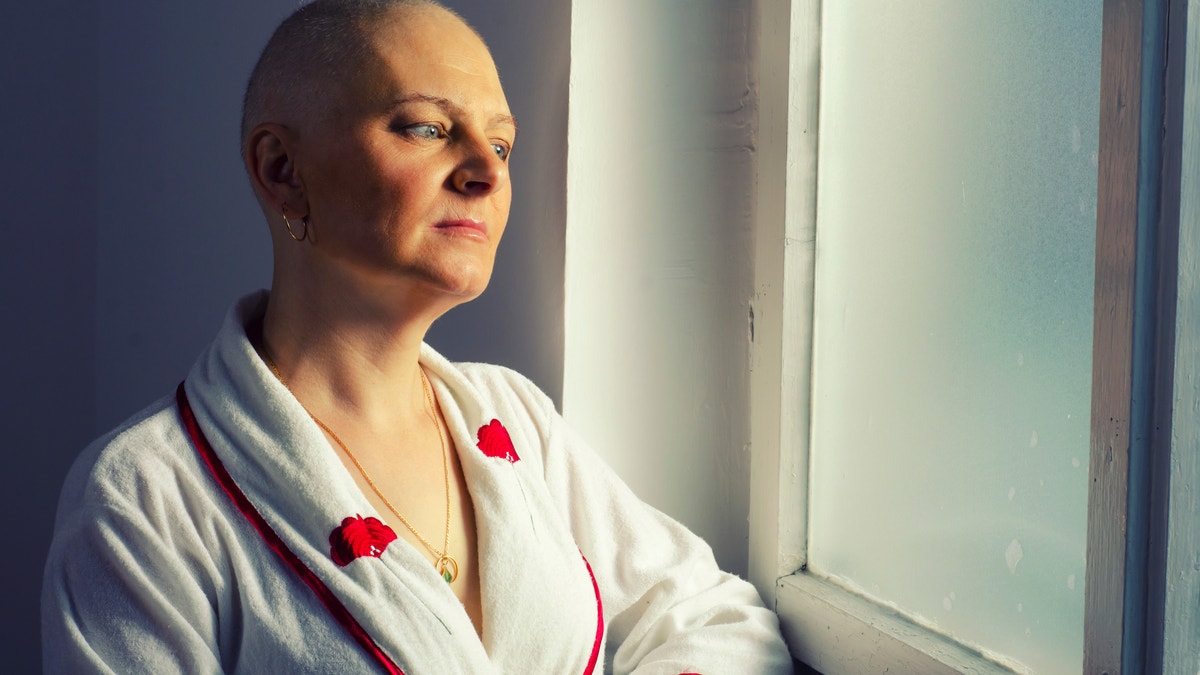
Bald woman suffering from cancer looking throught the hospital window. (iStock)
People who live through a bout with cancer are more likely to use medication for anxiety and depression than those without a history of malignancies, a U.S. study suggests.
About 19 percent of adult cancer survivors take drugs for depression, anxiety, or both, compared to roughly 10 percent of other adults, the study found.
"Survivors can have uncertainty about the future, worries about recurrence, altered self-image, concerns about relationships, financial hardships, unwanted physical changes, or new physical impairments," said lead study author Nikki Hawkins, a behavioral scientist at the U.S. Centers for Disease Control and Prevention in Atlanta.
"The cumulative effect of these worries and changes can take a toll on survivors' long-term emotional wellbeing - a likely reason why we see a higher rate of medication use in this group," Hawkins added by email.
To assess use of psychiatric medications after cancer, researchers examined survey data collected from 2010 to 2013 from 3,184 people with a history of tumors and 44,997 adults without any history of malignancies.
Almost 14 percent of cancer survivors took antidepressants, compared to 8 percent of the other adults in the study, researchers report in the Journal of Clinical Oncology.
The difference was a little more pronounced for anti-anxiety medications, which were used by 17 percent of cancer survivors and 9 percent of other adults.
These findings suggest that 2.5 million cancer survivors take these psychiatric medications, the researchers estimate.
Cancer survivors were more likely to use drugs for anxiety when they were younger than 65, female, white, living with multiple chronic health problems and insured by government health programs such as Medicaid.
The profile of survivors most likely to use antidepressants was similar, but the type of insurance patients had didn't seem to influence whether they used medication. Being divorced or experiencing the death of a spouse did, however, make cancer survivors more likely to take depression medication.
One limitation of the study is that medication use is self-reported by survey participants, not verified by prescription data or medical records, the authors note. Researchers also couldn't determine whether people started taking antidepressants or anxiety medications before or after their cancer diagnosis. Plus, they didn't know if people received counseling or psychotherapy, or whether cancer survivors were being routinely screened for mental health problems.
Even so, the findings point to the need for cancer survivors to pay as much attention to mental health as physical health, Hawkins said.
"Depression and other types of distress can weaken the body's immune system, lead to poorer health habits, and has been linked with lower odds of survival after cancer," Hawkins said. "In other words, survivors' emotional health and physical health go hand-in-hand."
While not every cancer survivor needs to see a mental health specialist or take medication, patients should be aware that emotional symptoms could interfere with physical function, ability to participate in treatment, work, education, family life or quality of life in general, noted Dr. Alan Valentine, chairman of psychiatry at the University of Texas MD Anderson Cancer Center in Houston.
"We would not want a cancer survivor to be in untreated emotional pain any more than we would want them to be in physical pain," Valentine, who wasn't involved in the study, said by email.
When cancer survivors do take medications for depression and anxiety, they should also be aware that certain drugs have the potential to make cancer treatment less effective or heighten the risk of side effects, Valentine added.
Certain antidepressants, for example, are thought to make the breast cancer drug tamoxifen less effective, previous research has found. And, some psychotropic medicines can increase the odds that certain cancer drugs cause heart damage.
"Some studies have found interactions between antidepressants and specific cancer-fighting drugs that make the cancer treatments less effective, but we don't have answers about all the possible drug-to-drug interactions," Hawkins said.
"A knowledgeable health care provider can help develop a plan that includes mental health support that will not take away from cancer therapies and treatments," Hawkins added.








































